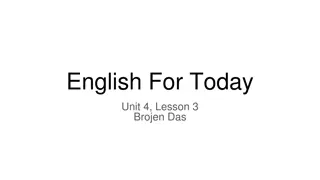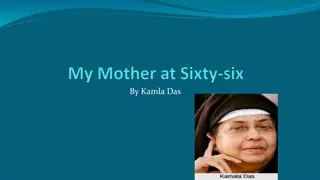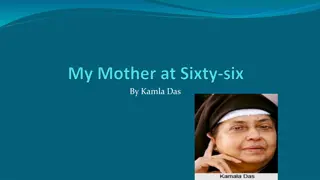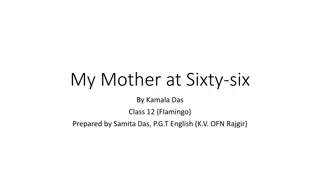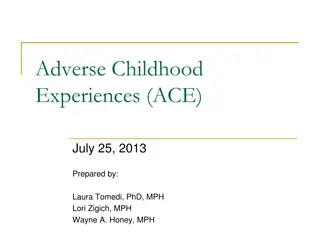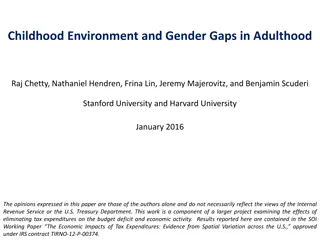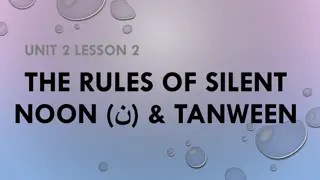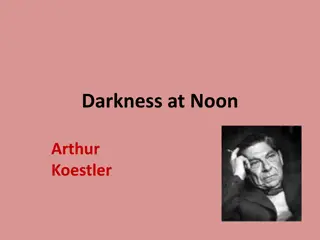Reflections on Childhood in "A Hot Noon in Malabar" by Kamala Das
Kamala Das's poem "A Hot Noon in Malabar" reflects on the nostalgia and longing for the carefree days of childhood spent with her grandmother. Through vivid imagery, she contrasts the lively atmosphere of Malabar with the alienation and discomfort of her present urban life. The poem captures the essence of memory, desire, and the bittersweet yearning for a lost paradise of innocence.
Download Presentation

Please find below an Image/Link to download the presentation.
The content on the website is provided AS IS for your information and personal use only. It may not be sold, licensed, or shared on other websites without obtaining consent from the author. Download presentation by click this link. If you encounter any issues during the download, it is possible that the publisher has removed the file from their server.
E N D
Presentation Transcript
A HOT NOON IN MALABAR Kamala Das (1934-2009) Mr : J. B. Khot Mr : J. B. Khot MA SET MA SET Department of English Department of English Kisan Veer Mahavidyalaya, Wai (Satar Kisan Veer Mahavidyalaya, Wai (Satara) a)
Introduction to the Poet Popularly known by her one-time pen name Madhavikutty and married name Kamala Das, was an Indian poet in English as well as an author in Malayalam from Kerala, India. Her popularity in Kerala is based chiefly on her short stories and autobiography. She was also a widely read columnist and wrote on diverse topics including women's issues, child care, politics among others etc. Kamala's first book of poetry, Summer in Calcutta was a breath of fresh air in Indian English poetry. She wrote chiefly of love, its betrayal, and the consequent anguish.
Introduction to the Poem The poem, A Hot Noon in Malabar , is taken from the collection of poems titled Summer in Calcutta (1965). It deals with Kamala Das s happy childhood spent in her grandmother s house in Malabar. It is full of pathos which shows Kamala Das s loss of happy and peaceful days of childhood which she spent in the loving and caring company of her grandmother. The action of the poem tosses between memory and desire, between nostalgia and estrangement. The poetess longs for the hot noon in Malabar which was full of life as compared to her torturing experience of noon in a big city where she settled after her marriage.
Poem This is a noon for beggars with whining Voices, a noon for men who come from hills With parrots in a cage and fortune-cards, All stained with time, for brown Kurava girls With old eyes, who read palm in light singsong Voices, for bangle-sellers who spread On the cool black floor those red and green and blue Bangles, all covered with the dust of roads, Miles, grow cracks on the heels, so that when they Clambered up our porch, the noise was grating, Strange This is a noon for strangers who part
The window-drapes and peer in, their hot eyes Brimming with the sun, not seeing a thing in Shadowy rooms and turn away and look So yearningly at the brick-ledged well. This Is a noon for strangers with mistrust in Their eyes, dark, silent ones who rarely speak At all, so that when they speak, their voices Run wild, like jungle-voices. Yes, this is A noon for wild men, wild thoughts, wild love. To Be here, far away, is torture. Wild feet Stirring up the dust, this hot noon, at my Home in Malabar, and I so far away ..
Thank You






